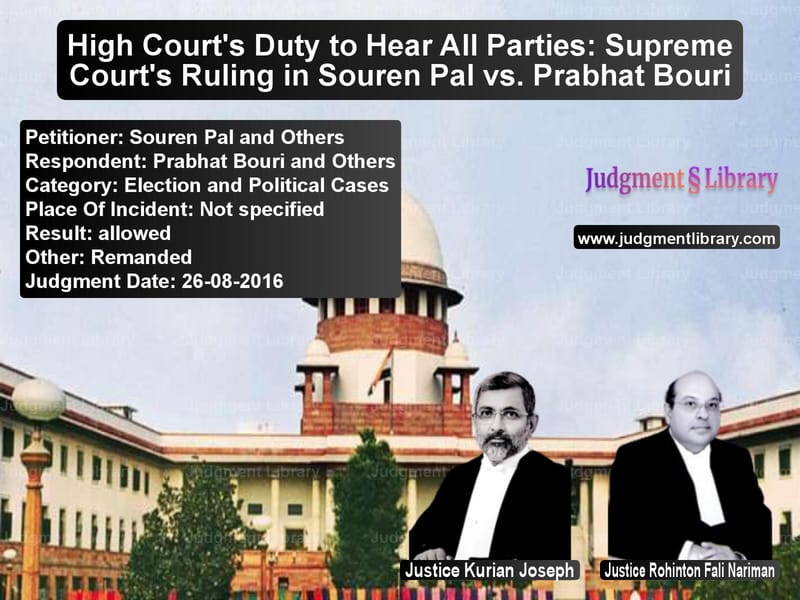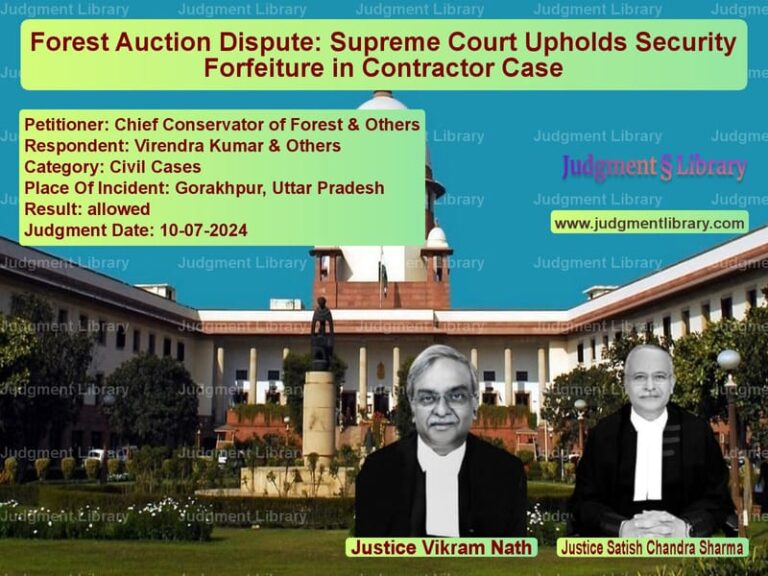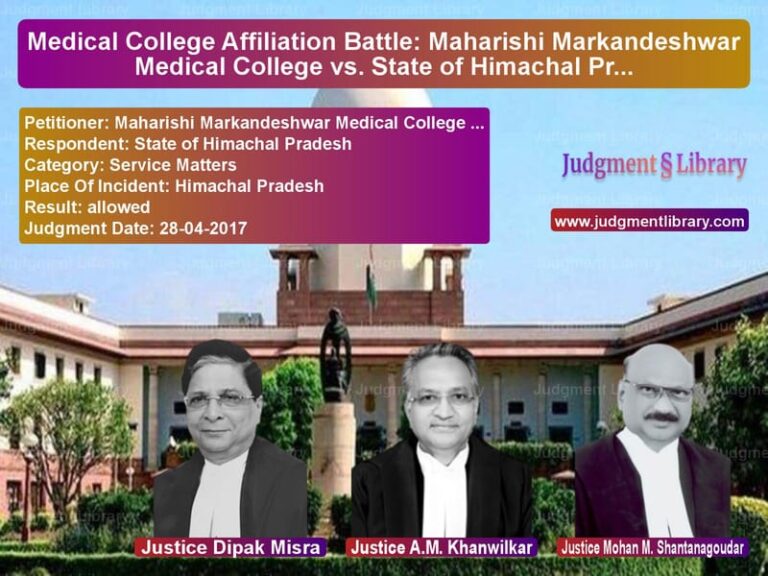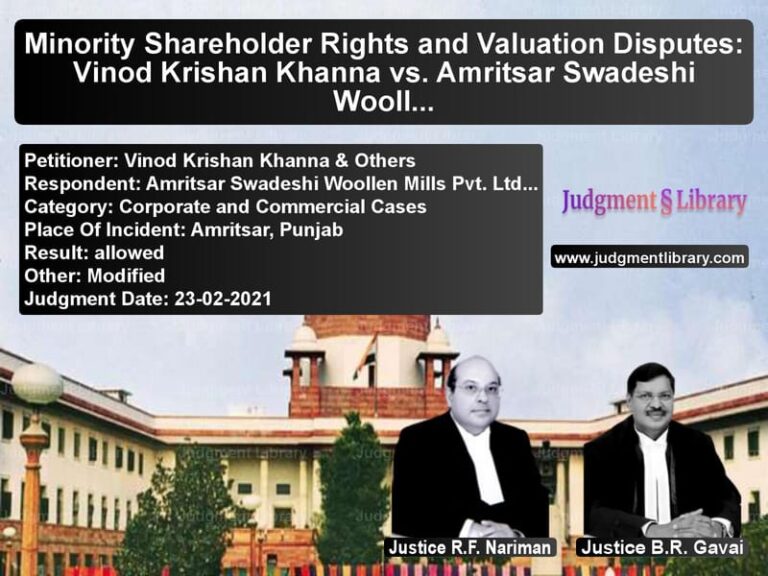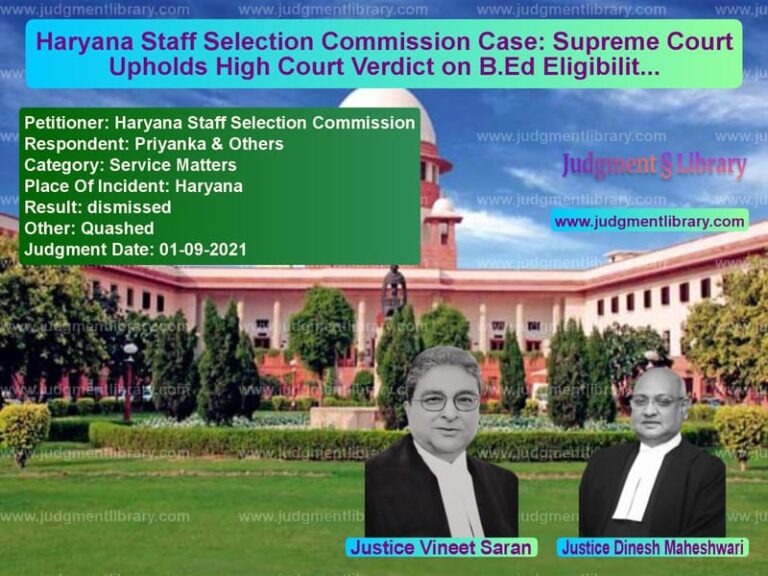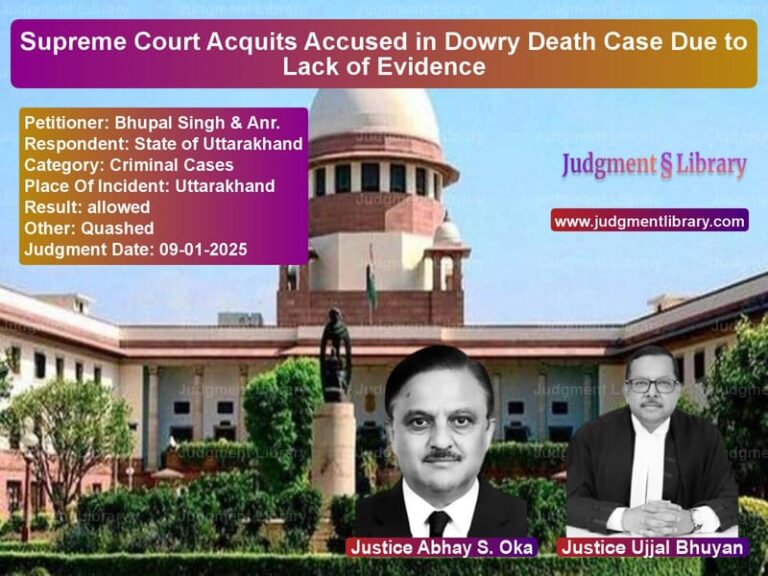High Court’s Duty to Hear All Parties: Supreme Court’s Ruling in Souren Pal vs. Prabhat Bouri
The case of Souren Pal and Others vs. Prabhat Bouri and Others revolved around the fundamental principle of natural justice—ensuring that all affected parties are given an opportunity to be heard before a decision is made. The Supreme Court of India addressed the issue of whether the appellants were denied a fair hearing when their elected positions as Directors were set aside by the High Court without giving them a chance to present their case.
Background of the Case
The appellants, Souren Pal and others, were elected as Directors in 2014. However, a dispute regarding their election led to legal proceedings before the High Court. The Division Bench of the High Court ruled against the appellants and set aside their election without giving them an opportunity to be heard. This led the appellants to approach the Supreme Court, seeking redressal for the denial of their right to present their arguments.
Arguments by the Appellants
The appellants raised the following key points in their plea:
- The High Court ruled on their election without giving them a chance to defend themselves.
- They had been lawfully elected in 2014, and removing them from their positions without a hearing was a violation of their legal rights.
- The principles of natural justice require that no one should be condemned unheard.
- The High Court should have at least given them notice and an opportunity to be heard before setting aside their election.
Arguments by the Respondents
The respondents, Prabhat Bouri and others, countered the appellants’ claims by arguing:
- The election process was flawed, and the High Court had correctly intervened to set it aside.
- The decision was made in the broader interest of justice and governance.
- The appellants’ claims of being denied a hearing were not entirely accurate as they had legal representation in earlier proceedings.
Supreme Court’s Observations
The Supreme Court critically examined the High Court’s ruling and emphasized the importance of ensuring procedural fairness in election disputes. The Court made the following key observations:
“The main grievance of the appellants is that they were not heard by the Division Bench while passing the impugned order despite the fact that, as per the impugned order, they have been unseated from the post of Directors, to which they were elected in the year 2014.”
The Court underscored that procedural fairness is a cornerstone of judicial decision-making. It held that:
“The Division Bench ought to have heard the appellants as well, having regard to the stage at which their election was set aside.”
Final Judgment
The Supreme Court ruled in favor of the appellants, stating that their right to be heard had been violated. Consequently, the Court:
- Set aside the High Court’s ruling.
- Remitted the matter back to the High Court for a fresh hearing, ensuring that the appellants were made parties to the proceedings.
- Directed the High Court to resolve the case within three months, considering that it was an election dispute from 2014.
- Extended the interim order passed by the Supreme Court, ensuring that the appellants remained in their positions until the High Court issued a fresh ruling.
Implications of the Judgment
The Supreme Court’s ruling has far-reaching implications for election disputes and procedural fairness in legal proceedings:
- Reaffirmation of Natural Justice: The judgment reinforces that courts must hear all affected parties before making decisions that impact them.
- Judicial Accountability: The ruling serves as a reminder to High Courts that procedural fairness must be maintained at all levels of adjudication.
- Precedent for Future Election Disputes: The case sets a precedent that no elected official can be removed without being given a fair hearing.
Conclusion
The Supreme Court’s decision in Souren Pal vs. Prabhat Bouri underscores the judiciary’s commitment to upholding principles of natural justice. By ensuring that the appellants were given an opportunity to be heard, the Court has reinforced the fundamental legal doctrine that no one should be adversely affected by a decision made without due process.
Don’t miss out on the full details! Download the complete judgment in PDF format below and gain valuable insights instantly!
Download Judgment: Souren Pal and Other vs Prabhat Bouri and Ot Supreme Court of India Judgment Dated 26-08-2016-1741878562489.pdf
Direct Downlaod Judgment: Direct downlaod this Judgment
See all petitions in Public Interest Litigation
See all petitions in Separation of Powers
See all petitions in Fundamental Rights
See all petitions in Judgment by Kurian Joseph
See all petitions in Judgment by Rohinton Fali Nariman
See all petitions in allowed
See all petitions in Remanded
See all petitions in supreme court of India judgments August 2016
See all petitions in 2016 judgments
See all posts in Election and Political Cases Category
See all allowed petitions in Election and Political Cases Category
See all Dismissed petitions in Election and Political Cases Category
See all partially allowed petitions in Election and Political Cases Category

